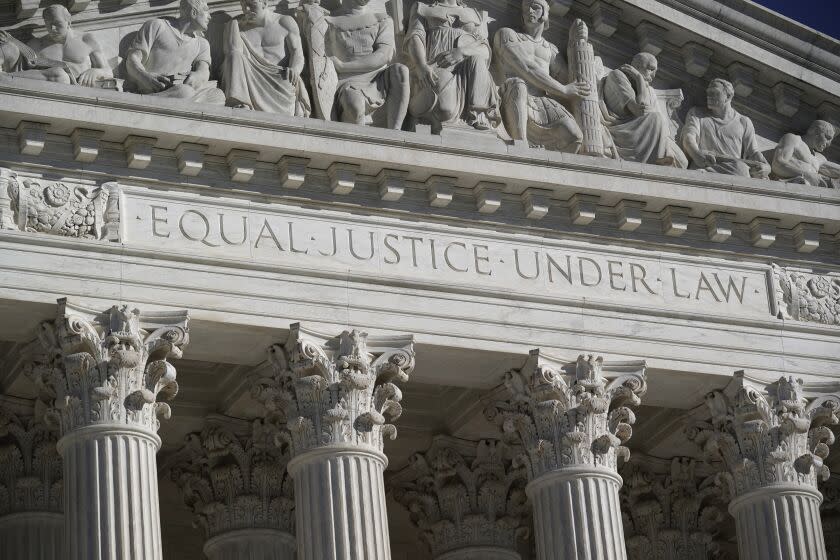Supreme Court hears lively debate on protecting wetlands, led in part by Justice Jackson

- Oops!Something went wrong.Please try again later.
- Oops!Something went wrong.Please try again later.
- Oops!Something went wrong.Please try again later.
The Supreme Court opened its new term on Monday by hearing a property rights appeal that calls for limiting the government's power to protect millions of acres of wetlands from development.
At issue is whether the Clean Water Act forbids polluting wetlands and marshes that are near — but not strictly part of — waterways.
Justice Ketanji Brown Jackson in her first day on the bench led the way in questioning why the court should move to limit the protection for wetlands.
She said Congress in 1977 determined that wetlands "adjacent" to rivers and bays should be protected. Why should the law be narrowed, she asked, "when the objective of the statute is to ensure the chemical, physical, and biological integrity of the nation's waters? Are you saying that neighboring wetlands can't impact the quality of navigable waters?"
Justices Elena Kagan and Brett M. Kavanaugh said they agreed with that view. Kavanaugh said that seven administrations — Republican and Democratic — had taken the view that wetlands were protected if they were near a waterway.
Damien Schiff, an attorney for Pacific Legal Foundation, agreed that some wetlands can be protected, but he argued property owners should not be blocked from developing their land simply because it has a marshy area.
His argument won favor with several of the court's conservatives who questioned how property owners of land near a waterway or a wetland would know if they were subject to federal regulation.
Jackson noted that the prior owners of the Idaho land were told it included protected wetlands.
"You keep talking about fair notice and property owners, about not being able to tell or know about this issue," she told Schiff. But with respect to the Idaho couple, "there seems to have been a prior determination that the land was a wetland before they bought it, and whether or not they know, they could have known, I presume."
For two hours, justices went back and forth in a lively debate among themselves and with the attorneys over how to define when property owners need a permit from the Environmental Protection Agency before they develop their land. It was unclear how the majority will rule.
Congress passed the Clean Water Act 50 years ago, but there has been a continuing dispute over whether federal authority extends to marshy areas or seasonal streams that are near a river, lake or bay.
In 2006, the high court was split on the issue. Four conservatives led by the late Justice Antonin Scalia said the EPA regulation was limited to permanent or flowing bodies of waters, not wetlands or seasonal streams. Justice Anthony M. Kennedy agreed on some limits, but not when there was "significant nexus" between a wetland and a flowing waterway.
That standard was denounced by builders, developers and farmers, who complained it led to overreach by federal regulators. They pointed to Michael and Chantell Sackett, the Idaho couple blocked from building a home on a vacant lot that sat across the road from scenic Priest Lake.
In 2004 the couple bought a lot that sat about 300 feet from the lake. Near the back of the property were wetlands that drained into the lake. The couple had done excavation work in the past, and they dumped gravel and sand in a soggy part of the lot as a first step toward building a home.
But in response to a 2007 complaint, an official from the EPA warned them their land contained protected wetlands.
Pacific Legal took up their case, and after losing in the 9th Circuit Court, it urged the Supreme Court to hear the appeal and to rein in the law.
"The Sacketts’ property contains no stream, river, lake, or similar waterbody," Schiff argued in its brief. "The Sacketts’ ordeal is emblematic of all that has gone wrong with implementation of the Clean Water Act."
In defense of the EPA, Justice Department lawyers said "wetlands such as swamps, bogs, marshes and fens ... play a critical role in regulating water quality. They provide flood control and trap and filter sediment and other pollutants that would otherwise be carried into downstream waters."
The court's conservative majority has shown itself to be skeptical of broad federal regulation. In June, the court blocked the EPA from adopting rules that would fight climate change by forcing a shift away from coal-fired power plants.
The Natural Resources Defense Council argued that wetlands are crucial because they "keep rivers, lakes, and streams clean. And they reduce flood damage and provide invaluable habitat for the nation’s abundant wildlife." If the court limits the scope of the law, "tens of millions of acres and countless other waters will lose federal safeguards that protect the health of our nation's waterways," the group said.
This story originally appeared in Los Angeles Times.

